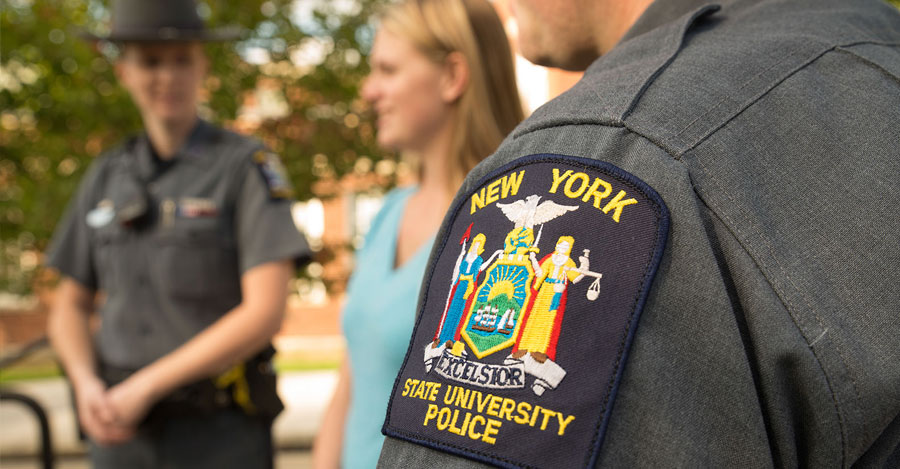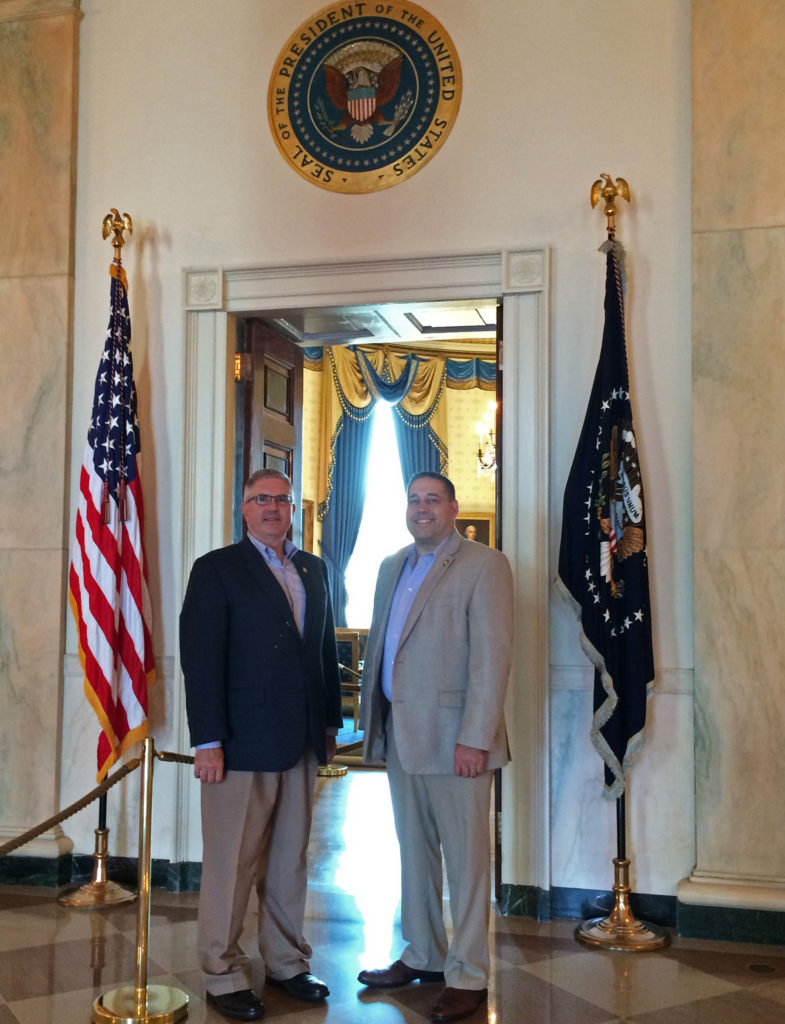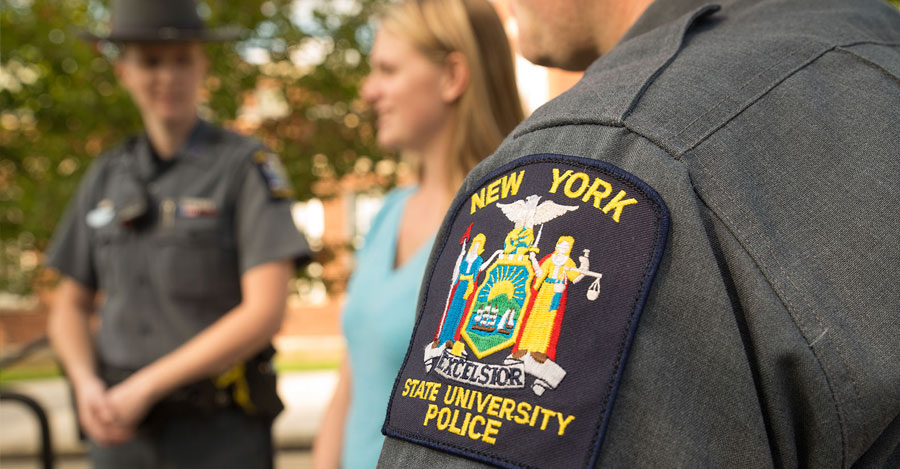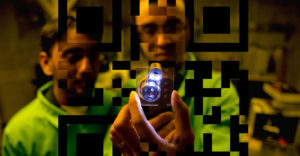
For nearly two years now, SUNY has been hard at work with their University Police Departments to give them an updated way of working in the field. The “fair & impartial policing perspective” reflects a new way of thinking about the issue of biased policing, and we are hard at work to bring that to all officers serving our state-operated campuses. The success is starting to show.
On September 8th, University Police Commissioner Paul Berger along with Deputy Commissioner Michael Bailey were invited to the White House to participate in a briefing on the “Final Report of the President’s Task Force on 21st Century Policing.” This briefing was designed as a discussion between representatives of the President’s Task Force and law enforcement leaders throughout the country, with the goal of coming up with solutions to improve relations between law enforcement agencies and the communities they represent.
A number of high ranking officials were at the event speaking to attendees. Opening remarks were given by Roy Autsin, Deputy Assistant to the President in the Office of Urban Affairs, Justice & Opportunity. Also on hand was Ron Davis, Director of Office of Community Oriented Policing Services for the U.S. Department of Justice, who gave a presentation on 21st Century Policing Practices.
What is Fair and Impartial Policing?
On December 18, 2014 President Barack Obama established the Task Force on 21st Century Policing with the goal of strengthening police/community relations and trust among law enforcement officers and the community they serve. The final report of the President’s Task Force was published in May 2015 and highlighted six pillars that will help build and restore positive relations between the community and police. The six pillars are building trust and legitimacy, policy and oversight, technology and social media, community policing and crime reduction, training and education, and officer wellness and safety. The final report also provides recommendations on how to successfully incorporate the six pillars into respective law enforcement agencies.

Since the publication of the Task Force’s final report, University Police leaders across the SUNY system have been working hard to implement many of the recommendations cited. In some cases, recommended strategies have already been standard operating practices of the University Police Department, particularly as it pertains to building relationships with the community we serve.
To get a better understanding of Fair and Impartial Policing and SUNY’s police work, we talked with SUNY University Police Commissioner Paul Berger. Paul has been the Commissioner of UPD since 2014, with 28 years of total service with the University Police.
Paul explains to us that your inherent biases are a collection of thoughts you develop as you filter all the info that you absorb on a daily basis. Whether you have a profoundly positive or negative experience, or you’re taught or influenced by others’ experiences, you incorporate all those thoughts and then filter the world through those behaviors. There’s too much info coming to us every day to allow us to take in the world as it comes. So over time, you build up a world view that has implicit bias in it. Its not good or bad, it just is the way things work in our brains.
But when it comes to behavior, what happens between your ears is up to you. For police officers, what happens on duty is the responsibility of the officer and the department (or the the captain). Police need their officers to be fair and impartial and not automatically assume things. There’s a degree of salesmanship in policing, trying to get people to buy into a shared vision of a safe community and sometimes to accept the officer’s authority. Police officers don’t want to turn off the other person in this transaction. They can’t let negative emotions govern rational thought, especially since the consequences can be so great.
If someone says you shouldn’t have bias, that’s impossible. We need to filter the chaotic world we live in. Remember that newborns even have bias, preferring mom or dad to hold them over aunt or uncle. But too many biases can be a negative thing. Commissioner Berger tells us that “In the USA, race, gender, obesity are the three physical attributes that people pick up on first. Its automatic. But this can allow negative interactions with individuals to also go against entire groups. This can be fixed, however.”
We need to understand why we think what we think. Is it rational thought, or emotional? If the only way people see police is when they’re putting someone in handcuffs, that creates a negative connotation. On the other hand, interaction with the community creates positive scenes and makes positive filters. So positive, non-enforcement interactions like department open houses, neighborhood meetings, and citizens’ police academies are vital to a strong relationship between law enforcement and community.
According to Commissioner Berger, we have this upper brain in which we can control our thought processes and get us to overlook our scenario. We want people to do that in policing. If you had a bad experience with a 4-door silver sedan and later saw another one while crossing the street, you might freeze up. But you use that brain power to investigate the scene. Look the driver in the eye, see that they see you and there’s no danger, and proceed to cross the street. Police do the same with their experiences. The goal is prevent the over-policing, or the under-policing, of individuals or communities. That keeps communities and officers safe.
In policing, today’s circumstance is not a person’s entire life. We can’t let 5 minutes become 20 years. But to get there takes work.
Training to be fair and impartial
Last year, University Police and Commissioner Berger met with Fair & Impartial Policing LLC to develop a training program for all of the state-operated SUNY schools that have police departments on campus. In January 2016, a Train the Trainer event was held in Syracuse. Setting up a plan to do things regionally, a goal was established to put all campuses and 100% of UPD personnel through the fair and impartial training by the end of 2016. To this point, 19 of 30 state operated campus police departments have completed the training, along with 219 outside officers non-affiliated with SUNY.
A benefit to the SUNY training program is that there are UPD training centers right near campuses, so this bias training can be shared with other agencies nearby and be taught outside the campus community. For example, in October, SUNY New Paltz is training all of the officers from the town of New Paltz Police Department. To this point, we’re seeing good things at the training. The officers and staff are engaged and involved throughout the process, not just waiting for time to expire. According to Commissioner Berger, “University Police wants to be the center of gravity for this training in New York State. I want us to be known for that.”
One of the main points being made through these training sessions is that if we serve people well and understand them the right way, we can do more and better things for the whole community. If law enforcement practices high visibility, frequent public contact, educational programming in a problem solving orientation, and commit to treating everyone fairly and impartially, that creates a good, positive relationship with the community. That’s something that can make everyone feel safe and secure.





thanks for the information.. so interest and inspiring.. 😀
nice information// 😀
Thanks, for your Information
Thanks for your infomration 🙂
Can I Ask ? What is main mission of SUNY?
Main purpose I think of course for education.